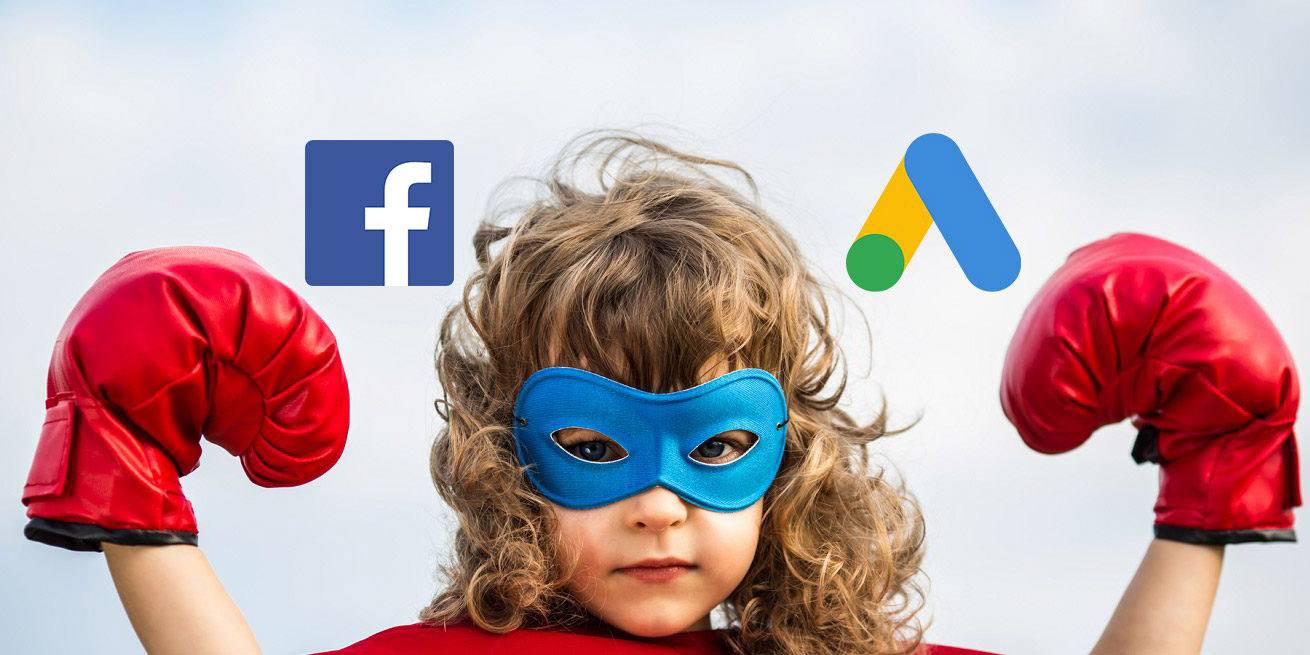If you’re comparing Google AdWords vs. Facebook Ads, you should know one thing before you go any further: there’s no such platform as AdWords any more. In 2018, the AdWords platform was rebranded, and now it’s called Google Ads.
However, the new title isn’t really important. It’s what’s inside that counts, isn’t it?
Google is the number one search engine. According to Statista, it has an over 90% share of the search engine market.
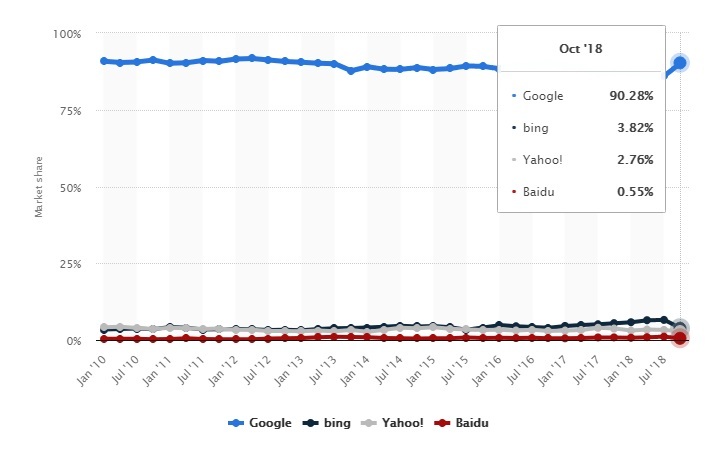
Google was developed to bring order to the chaos of the World Wide Web. But nowadays, it goes far beyond its initial purpose. Launching a website and promoting it has become two sides of the same coin.
One the one side, you have to follow SEO standards established by Google to make your website searchable. On the other side, the search engine offers plenty of unique advantages for advertising your online business.
Facebook is the top social network and the second largest advertising platform in the world. In 2006, Google tried to acquire it twice. Today, the social network is breathing down the search engine’s neck when it comes to providing advertising services.
Mark Zuckerberg has made it clear that he and his team won’t give up:
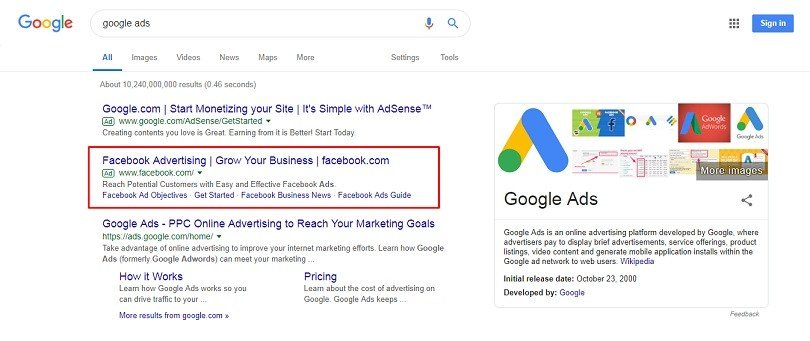
The battle between the two giants is in full swing, allowing the market to evolve and giving benefits to businesses and advertisers. In this guide, we’ll mention these benefits and analyze how you can use them to reach the highest possible ROI.
But first, let’s start with the basics.
What Is Google Ads?
With Google Ads, you can stay local or go global and reach billions of potential customers. The places where Google Ads can appear make up the Google Network:
- Search Ads (the Search Network) show up on search engine results pages (SERPs).
- Display Ads (the Display Network) show up on over 2 billion websites, including in search results, on Google websites, on Google partner websites, in Gmail, and in over 650,000 apps. By the way, if you want to save time on creating Display Ads, test our artificial intelligence platform. We’ll give you 10 free AI-generated ads right now.
- Video Ads are shown to over one billion YouTube users. You can pick the audience for your ad using different filters. And you pay nothing if a user skips your ad before the end.
- App Ads (Universal App Campaigns) promote your app across the Google Network. You can launch an automatic ad campaign one time and a machine learning engine will show your ad for you based on 300 million signals.
- Shopping Ads are part of the Display Network. They’re probably the best option if you run an eCommerce business. A shopping ad shows up along with the name of your online store, the price of a product, and other information.
Are you weighing the pros and cons of Google vs. Facebook advertising? Google Ads will more likely boost your conversions regardless of what you run, whether it’s an online business or a local store.
People use the search engine to find what they need, buy products, and access services. In other words, customers will come to you with a specific intention. All you need to do is find the right way to invite them to your website.
Here are a few arguments for and against using this platform:
Major Advantages
- Reach nearly half of the world’s population. According to Wikipedia, over 55% of people have internet access. And a large majority of them choose Google as their search engine.
- Keyword marketing. You can tell the search engine whom you want to show your ads to by picking relevant keywords for your campaign.
- YouTube ads. The top video sharing website is a great marketing channel for publishing your ads.
Major Disadvantages
- Paid ads vs. organic results. The sponsored ad label causes rejection in some cases, while showing up in search engine results naturally helps to achieve credibility.
- Keywords may cost you a bundle. Based on the bidding system, the more popular the keyword, the more expensive it will be. In some industries, the competition is high, which automatically throws out those with a low budget.
We hope you’ve gotten the picture about Google Ads. Now let’s see the difference between this platform and the one offered by Facebook.
What is Facebook Ads?
Facebook has over two billion monthly active users. That’s the second largest online audience in the world, and it’s increasing every quarter.
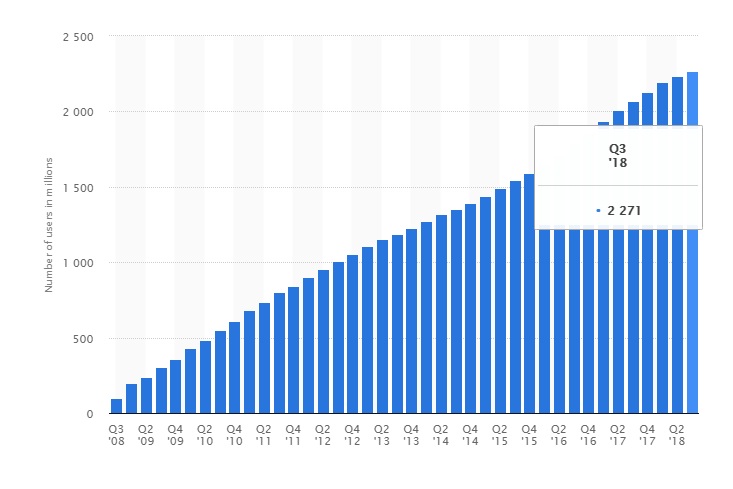
You can target future customers and fans on Facebook in two ways:
- By creating a Facebook Page and using Ads Manager if you manage your ad campaigns yourself.
- By creating a business account and using Facebook Business Manager if other people help you run ad campaigns or you run ad campaigns for other people.
There are more than a dozen types of Facebook ads. You can use them to fulfill different marketing strategies, mixing text, images, and videos in different ways.
When comparing Google Ads vs. Facebook Ads, keep in mind that users come to Facebook for social networking.
Google doesn’t have to drive users to your website because they already come to Google with a purpose.
So how does the social network deal with the fact that people aren’t on the platform to buy things?
Facebook uses personal information, namely a user’s age, location, interests, views, and behavior. They let advertisers select audiences based on this data, thus showing relevant ads to users.
Here are a few pros and cons to help you understand the basics of Facebook ads:
Major Pros
- Easy from the beginning. Of course, it takes time to dig into either of these platforms, but unlike its main rival, Facebook Ads allows you to do this in a few clicks straight after you create your Page. Since Google Ads is a more sophisticated system, signing up and launching your first ad takes more time.
- Spend smartly. Facebook helps advertisers spend wisely. For instance, you can set a $1 budget for an ad and the system will show you the potential reach you can get. Or instead, the system may encourage you to spend $5 and offer more opportunities to hit your target more effectively.
- Always affordable. Facebook has created a comfortable environment for small businesses. You can get leads regardless of how much money you’re ready to spend.
- Extra placements. You can show your ads not only on Facebook but also on Instagram, Messenger, and in the Audience Network.
Major Cons
- You’ll need to learn about Facebook marketing objectives. On Facebook, you can increase your brand awareness, attract leads, grow app installs, boost conversions, and more. But to sharpen your skills in Facebook marketing, you have to know how to pick the right combination of objectives.
- You can’t spend less than $1. That’s a rule.
Facebook Ads vs. Google Ads: Notable Statistics
Now let’s review the difference between Facebook Ads and Google Ads by analyzing statistical data.
Advertising Revenue
Let’s start by looking at Facebook vs. Google advertising revenue. The search giant reached over $95 billion in advertising revenue in 2017.
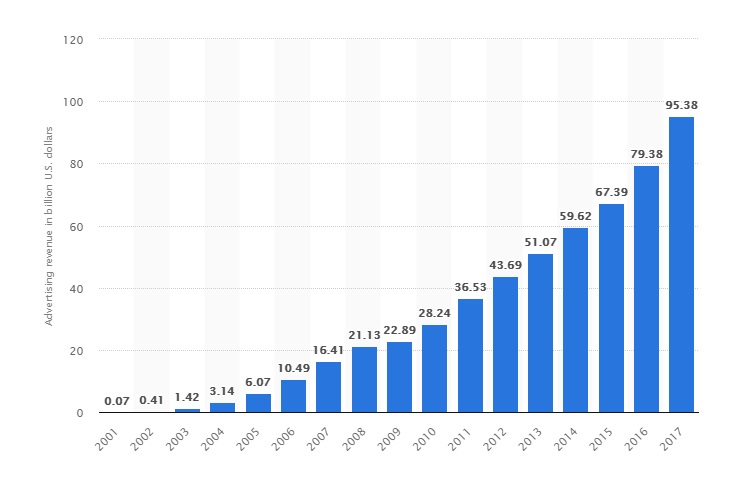
As for the social media giant, its annual advertising revenue reached almost $40 billion in 2017.
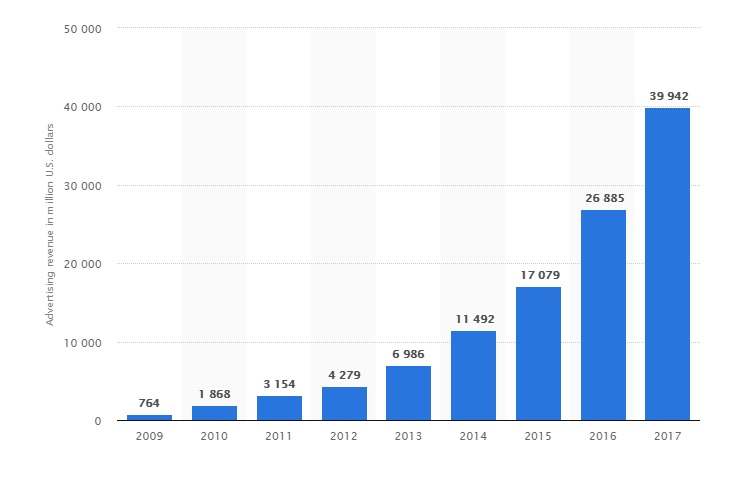
As you can see, the difference in revenue is directly proportional to the difference in the number of active users, which is also nearly 50%.
Number of Active Advertisers
According to Business Insider, Google was cooperating with nearly 4 million advertisers in 2015. Unfortunately, the company doesn’t disclose the precise number to the public. But if Google ad revenue is anything to go by, its army of advertisers has increased significantly since then.
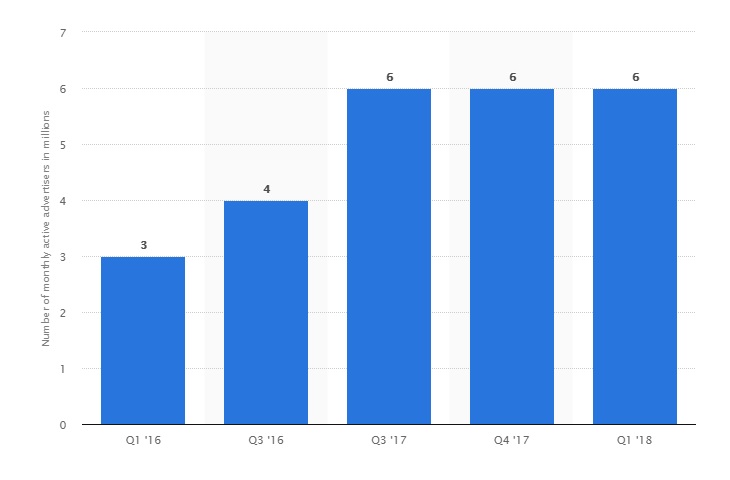
The chart above shows that the number of active advertisers on Facebook has remained stable over the last two years. As of Q1 2018, more than 6 million businesses engaged in Facebook marketing.
How to Combine Google and Facebook Advertising
We recommend using both platforms together rather than separately simply because it makes sense. We hope we’ve given enough arguments for that above. If your budget is limited, make progress piece by piece with a focus on your major goals.
Spread the Same Message with the Same Keywords
While we’re only learning how to use both platforms for marketing, people already combine Facebook and Google for their personal needs.
If users see your ad on Facebook, some of them are likely to search for information about your offer or your brand on Google. In this case, using the same keywords or keyword combinations for Google and Facebook ads is a smart move.
Let’s imagine you sell jewelry. You offer new earrings, and you create an identical ad for both platforms that includes your brand name and several keywords related to your product.
When users stumble upon the Facebook ad, they Google your brand and find the ad with the same headline on the search results page. People may also Google the words from your Facebook ad description. As a result, your chance of converting a lead into a buyer increases significantly.
Cross-Platform Retargeting
You’ve already launched retargeting (also called remarketing) campaigns, haven’t you? If not, we recommend using this time-tested method for lead generation on a regular basis.
Instead of choosing between Google Ads or Facebook Ads, you have to switch that “or” to “and” in order to take advantage of cross-platform retargeting.
In other words, you can remind people who’ve visited your website from a Google Ad about your brand by retargeting them with an identical ad on Facebook.
How? Go to the Audience tab in Ads Manager and:
- create a Custom Audience that corresponds to your website or the page the Google Ad leads to;
- create a Lookalike Audience that includes leads from the identical Google Ads campaign.
This way, you’ll remind users who came from your Google Ad about the offer they were looking at.
Analyze Data from One Platform to Use It for Another
If you already advertise on Google and are considering Facebook as an extra option (or vice versa), you have a significant advantage: you know your target audience, its age, its interests, and other priceless information. You can use this data for your future campaigns.
If you’re only getting started with online advertising, focus on any two platforms you wish. Wait for some time to achieve results on the first platform, then use them to expand your presence on the second platform.
Launch Automated Ads
Automated ads are a new trend that’s gaining momentum. They’re offered by smaller companies like Softcube, which produces automated video ads, as well as advertising giants like Google and Facebook.
- Smart Campaigns from Google. These ads appear when users search for words related to your business. A smart ad looks like this:

- Dynamic Ads from Facebook. We’ve already written about this type of Facebook ad campaign on our blog. If you’re interested, read our guide on how to set up Dynamic Ads and use them to meet the needs of your business.
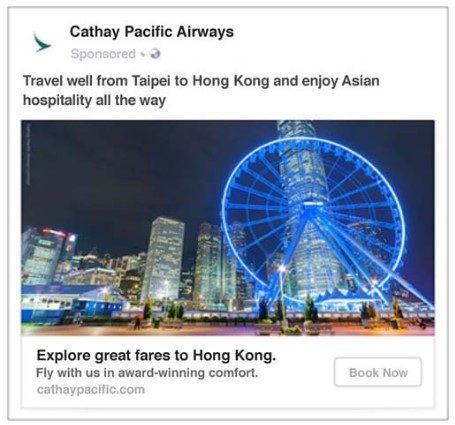
Both Smart Campaigns and Dynamic Ads need to be launched only once — the rest is on the shoulders of the system. If your product is a mobile application, scroll up to the Google Ads basics part of this article to learn more about Universal App Campaigns.
Setting up automated ads on both networks, you kill two birds with one stone. You’re more likely to attract more leads while doing what you love the most, i.e. running your business. Also, you can consider this a test. Discover which platform works best and turn off an ad campaign if it’s ineffective.
Promote Your Online Business Organically
Remember that you shouldn’t fully rely on paid advertising when contrasting Facebook vs. Google Ads.
Your major priority should still be organic promotion through search engine optimization (SEO) for your website and active involvement on your Facebook community: posting, sharing, commenting, and more.
By prioritizing these two strategies, namely growing your brand awareness on two of the world’s major marketing funnels, you’ll increase your presence across the entire web.
Google Ads (formerly AdWords) vs. Facebook Ads
In this article, we listed the Facebook Ads and Google Ads differences, their basic features, useful statistics, and reasons why you should use both platforms rather than pitting them against each other.
Don’t forget to try AI-powered video advertising. Our artificial intelligence platform can produce one thousand video ads within a week and do it for an image-sized budget. Sound interesting?
Test Softcube AI for your Facebook ads and Google Ads campaigns right now.
